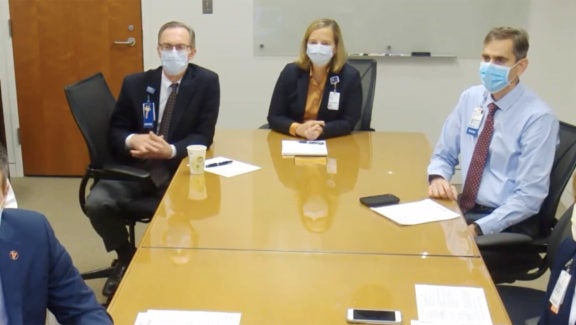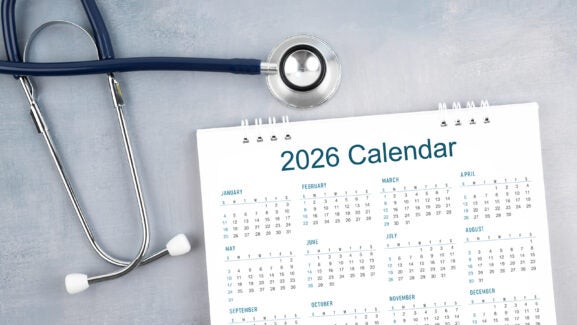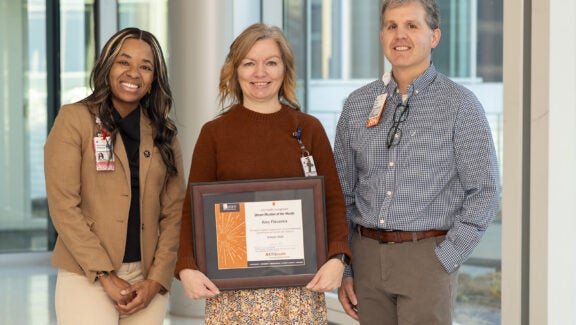
Worried About the Pfizer and Moderna Vaccines? Here’s What You Need to Know
Team members who sign up for COVID-19 vaccination could receive either the Pfizer or Moderna vaccine. Below are answers to the 13 top questions being asked as well as a chart comparing the two vaccines.
Q. Are COVID-19 vaccines safe for pregnant women?
The Food and Drug Administration and Centers for Disease Control do not consider pregnancy a contraindication to vaccination. In addition, vaccination is supported by the Society for Maternal Fetal Medicine. To definitively determine safety during pregnancy, additional data are needed. Team members who are pregnant should discuss options with their primary care provider (PCP) or obstetrics (OB) provider(s). They will be provided vaccine by UVA if they and their provider agree it is safe to sign up.
Q. I am breastfeeding. Are COVID-19 vaccines safe for me and my baby?
The Food and Drug Administration and Centers for Disease Control do not consider breastfeeding to be a contraindication to vaccination. In addition, vaccination is supported by the American College of Obstetricians and Gynecologists. To definitively determine safety during breastfeeding, additional data are needed. Team members who are breastfeeding should discuss options with their PCP or OB provider(s). They will be provided vaccine by UVA if they and their provider agree it is safe to sign up.
Q. Are COVID-19 vaccines safe for individuals who are immunocompromised?
The Centers for Disease Control has listed immunocompromised patients as a group that should be prioritized for receiving the vaccine. Patients with an immunocompromising condition are typically not vaccinated if a live virus vaccine is being used. Since Pfizer and Moderna vaccines are not live, vaccination should not be a problem. Before signing up for a COVID-19 vaccine, individuals who are immunocompromised should consult with their healthcare provider.
Q. I have a history of food, latex, venom, or inhalant allergies. Can I still get the vaccine?
Yes. Food, latex, venom, or inhalant allergies are not a contraindication or precaution to vaccination with either the Pfizer or Moderna vaccines. Persons with a history of an immediate allergic reaction of any severity to a vaccine or injectable therapy and persons with a history of anaphylaxis due to any cause should be observed for 30 minutes following vaccination.
Q. I have a history of severe allergies (anaphylaxis) to vaccines or other injectable medications. Can I still get the vaccine?
The Centers for Disease Control considers a history of a severe allergic reaction to vaccines or other injectable medications to be a precaution to vaccination. In considering COVID-19 vaccination, the risk of a potential allergic reaction should be weighed against the benefit of the immunization. Persons with a known allergy to COVID-19 vaccine components including polyethylene glycol (PEG) or polysorbates should not receive a COVID-19 vaccine containing that component but may be able to receive alternate vaccines. We encourage a conversation with your doctor. Persons with a history of an immediate allergic reaction of any severity to a vaccine or injectable therapy and persons with a history of anaphylaxis due to any cause should be observed for 30 minutes following vaccination.
Q. I hear that UVA Health is offering both Pfizer and Moderna vaccines. Can I choose which one I want to get?
Not at this time. Since vaccine supplies are being allocated to us by the Virginia Department of Health, we are unable to control the type or quantity of the vaccine doses we receive. We are administering vaccines in the order in which shipments arrive.
Q. If my first dose is the Pfizer vaccine, can I get the Moderna vaccine as my second dose?
No. Your two doses must be the same vaccine.
Q. How do these vaccines work?
The COVID-19 vaccines from Pfizer and Moderna represent the first-in-human application of RNA technology. While many common vaccines are composed of proteins, RNA vaccines work by injecting the blueprint for a protein (the messenger RNA) into the patient and allowing it to promote production of a protein inside the cell. Thus, your body produces the protein target for the immune response.
Q. Can I get COVID-19 from the Pfizer or Moderna vaccines?
No. The COVID-19 vaccines created by Pfizer and Moderna do not have any virus or other infectious material in them. They are designed to cause your body to make copies of a harmless piece of the coronavirus, so you will not, and cannot, get COVID-19 from the vaccine.
Q. Is there a difference between the Pfizer and Moderna vaccines?
Both of these vaccines use mRNA materials, as described in the answer above. They have similar mechanisms of action and composition. At this time, their reported side effects are similar. The main difference is that the second dose for Moderna is 28 days after the first whereas the second dose of Pfizer vaccine is 21 days after the first. The fact sheets for each are available on the Learn About the COVID-19 Vaccine page.
Q: What if I can’t get my vaccine exactly at 21 (Pfizer) or 28 (Moderna) days after my first dose?
The second dose should be administered as close to the recommended date as possible, however, there is a 4-day grace period.
- Pfizer: The recommended interval between doses is 21 days, but the second dose can be given as early as 17 days after the first dose is received. Providing second doses before 17 days is not recommended.
- Moderna: The recommended interval between doses is 28 days, but the second dose can be given as early as 24 days after the first dose is received. Providing second doses before 24 days is not recommended.
Q. Are Pfizer and Moderna vaccines safe?
The COVID-19 vaccines from Pfizer and Moderna represent the first-in-human application of RNA technology which has been studied in animals for years and found to be safe.
Q. Can these vaccines alter your DNA?
RNA cannot affect the genetic material of a cell. It degrades quickly once inside, so the vaccine material is short-lived after injection.
Comparing COVID-19 Vaccines
| Manufacturer | Pfizer | Moderna |
|---|---|---|
| Population studied | 16 years of age or older, both healthy people and those who have other health problems | 18 years of age or older, both healthy people and those who have other health problems |
| Number of study volunteers | Over 43,000 people (half got the vaccine, half got placebo ("fake vaccine")) | 30,000 people (half got the vaccine, half got placebo ("fake vaccine")) |
| Efficacy (how well it works) | About 95% protected from COVID-19 | About 94% protected from COVID-19 |
| Dosing | 2 doses, 21 days apart; shot in the muscle | 2 doses, 28 days apart; shot in the muscle |
| How soon does protection start | Measured at 7 days after second dose | Measured at 14 days after second dose |
| Most common side effects (>2%) | Fatigue, headache, joint pain, pain/redness where shot was given | Fatigue, muscle aches, joint pain, headache, pain/redness where shot was given |
| Serious side effects | Rare in clinical use | Rare in clinical use |
Have more questions?
Check out the COVID vaccine FAQs:
In case you missed it

Latest News



